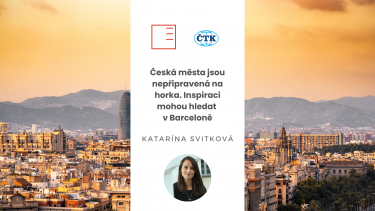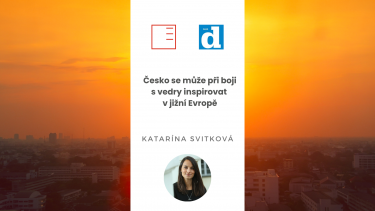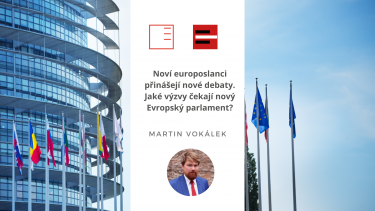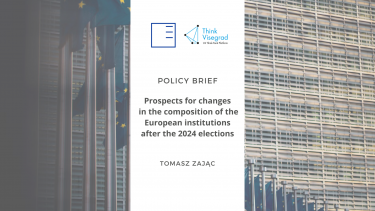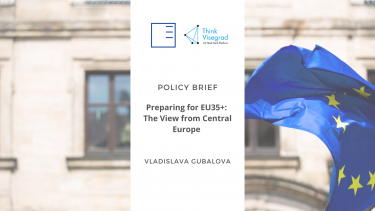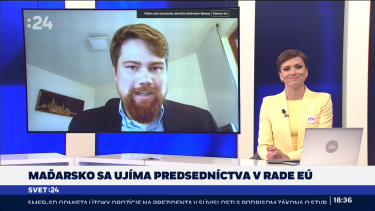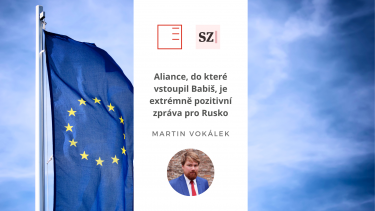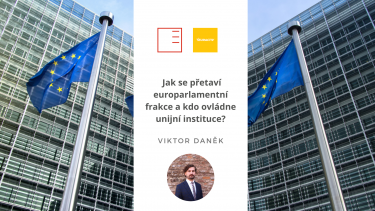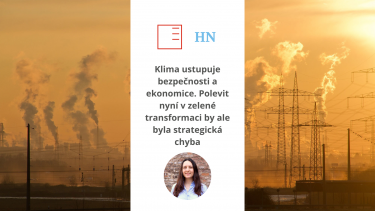ČTK | Czech cities are unprepared for heatwaves. They can find inspiration in Barcelona
Czech cities can draw inspiration from southern Europe in combating heat, such as Barcelona, which has effective plans and is better adapted to high temperatures. For instance, the city boasts over two hundred "climate shelters" in publicly accessible spaces like museums, galleries, offices, and libraries, providing drinking water, air conditioning, and informational services. However, the Czech Republic is unprepared for heatwaves. Associate Researcher Fellow at EUROPEUM Institute Katarína Svitková commented for the Czech News Agency.
Show more
Deník.cz | Czech Republic can find inspiration in southern Europe in the fight heatwaves
Czech cities could take inspiration in combating high temperatures from cities in southern Europe, such as Barcelona, which has effective plans and is well-adapted to extreme heat. Barcelona boasts over two hundred climate shelters in publicly accessible institutions like museums, galleries, offices, and libraries, providing drinking water, air conditioning, and informational services. According to Katarína Svitková, an Associate Research Fellow at EUROPEUM Institute, Czechia lacks action plans and responds to heat only at the last minute. Preparedness for tropical days is crucial for protecting the population, especially seniors and young children, for whom summer days are the most demanding.
Show more
Czech Radio | New MEPs bring new debates. What challenges await the new European Parliament?
According to the Executive Director of EUROPEUM Institute Martin Vokálek European topics will be more frequently discussed in the public sphere. The reason for this are the newly elected MEPs, who met for the first time this week at a plenary session in Strasbourg. Their ranks include not only "traditional" politicians but also prominent figures with unconventional approaches. What challenges and changes can we expect from the new European Parliament? Listen to the Czech Radio podcast Bruselské chlebíčky.
Show more
Policy Brief | Prospects for changes in the composition of the European institutions after the 2024 elections
This policy brief analyses the prospective changes in the European Parliament (EP) composition following the 2024 elections. It reflects on the evolving political environment since 2019, highlighting shifts in party dynamics within the EP, such as the fragmentation of traditional party dominance and the emergence of new political alignments. Additionally, it explores potential reconfigurations in top EU positions post-elections and examines ongoing concerns regarding geographical representation within EU institutions, particularly the European Commission. Writes Tomasz Zając from the Polish Institute of International Affairs (PISM).
Show morePolicy Brief | Preparing for EU35+: The View from Central Europe
Despite the historical support of EU enlargement policy by the Visegrad Four (V4), these Central European states are now faced with the challenge of reconciling their stances with the new realities of the process. As Ukraine and Moldova opened their accession negotiations, the EU seems to be torn on the questions associated with the future enlargement(s) - institutional reforms and changes within the EU budget. Transitioning from economic beneficiaries to potential contributors, the V4 states must evaluate the potential political and economic impacts of new members on both the EU and their domestic levels. Writes and proposes recommendations Vladislava Gubalova from GLOBSEC.
Show moreWhatNews | Cities are expecting another heat wave this year. What is Prague doing to keep us from getting baked?
The average temperature in the Czech Republic has increased by 2.2 degrees Celsius since the 1960s. As a result of climate change, the country is suffering more frequent weather extremes: torrential rain, drought and heat. Heat waves are particularly severe in heat islands that form in cities. Prague wants to rapidly reduce greenhouse gas emissions, add greenery and water features. Will it be enough? Katarina Svitková, an Associate Research Fellow at EUROPEUM Institute gives examples to WHAT news on how Barcelona is adapting to the heat.
Show more
RTVS | Hungary takes over the Presidency of the EU
From this day Hungary holds the Presidency of the EU. It takes over the Presidency from Belgium and will set the European agenda until the end of the year. The Hungarian Presidency says it wants to find real solutions to real problems. But some analysts fear that important issues, including support for Ukraine, could take a back seat. Martin Vokálek, executive director of EUROPEUM Institute, comments for RTVS.
Show more
Seznam Zprávy | The political group in the EU that Babiš has joined is extremely positive news for Russia
Former Czech Prime Minister Andrej Babiš has announced the formation of a new alliance Patriots for Europe for the European Parliament. For the time being, in addition to the ANO movement, it consists of Hungarian Prime Minister Viktor Orbán's Fidesz and Herbert Kickl's Austrian FPÖ party. Martin Vokálek, executive director of EUROPEUM Institute, comments on its formation and importance.
Show more
Euractiv.cz | Post-election reshuffles. How will the European Parliament factions transform and who will dominate the EU institutions?
The key issues for the new term in the EU do not end with the European elections. Forces in European Parliament continue to shift depending on factions, while leaders select institutional leadership. How will the elections and the composition of the European Parliament influence the future functioning of the EU? And who will lead it? Viktor Daněk, Deputy Director of EUROPEUM Institute, answered these questions for Euractiv.cz.
Show moreHospodářské noviny | Climate is giving way to security and economy. However, easing off on green transformation now would be a strategic mistake
This year's elections to the European Parliament have sparked debates about continuing the European plan to reduce greenhouse gas emissions to net zero by 2050, despite recent events suggesting the need to reassess this plan. The election results did not signify as much of a setback for European green ambitions as anticipated. The priority of climate and environment is no longer as high among most Europeans as it was five years ago, reflecting current political and international challenges such as security, economic prosperity, and the competitiveness of European industry. Kateřina Davidova, a researcher at EUROPEUM Institute, wrote an opinion piece on this topic for Hospodářské noviny.
Show more
Staroměstské náměstí 4/1
Prague 1 - Staré Město
110 00
tel.: +420 212 246 552
email: europeum@europeum.org
https://www.europeum.org
